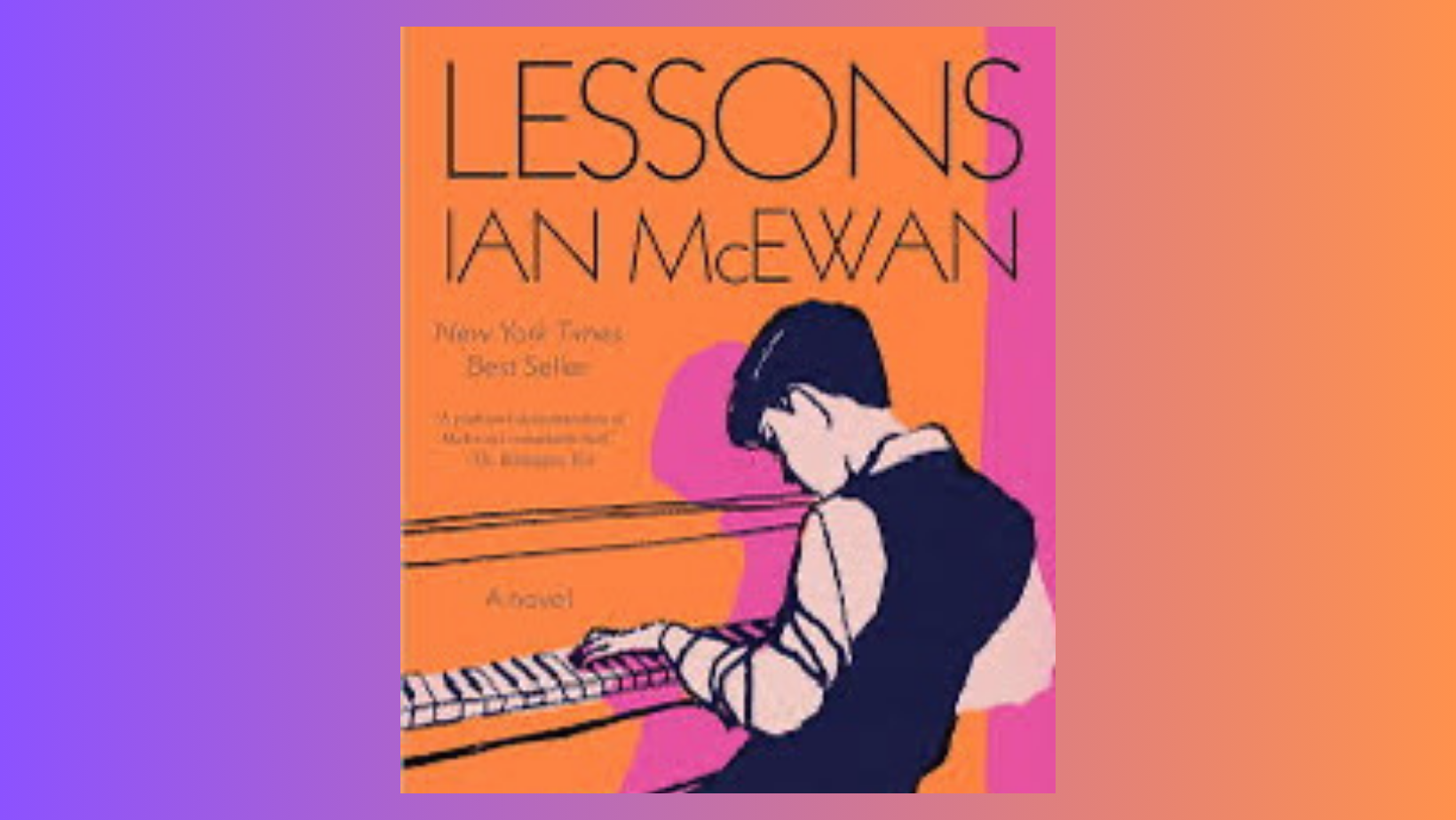With his “Lessons” (2022), Ian McEwan has written his longest text by far. It is about 500 pages long. Partly, this text is autobiographical—and this is not the first time McEwan draws on his own life. In the novel “The Children Act” (2014), one can see a reflection of the writer’s legal battle with his own wife over their child. There is undoubtedly a certain courage, self-criticism, self-irony, and, on the other hand, a certain self-indulgence in putting the facts of one’s own life into the biography of a common man whose biography is essentially falling apart. The main character of “Lessons,” Roland Baines, like Ian McEwan, spends his childhood in foreign military garrisons where his father served, in Libya and Germany; upon his arrival in England, he is sent to boarding school. The story of his brother Robert, whose existence Roland learns about later and who was once given up for adoption, turns out to be autobiographical (even the text of the advertisement for adoption is used verbatim in the novel). The personal life of the writer is also used in a slightly altered form elsewhere. McEwan’s wife, who left him with a child, is transformed into the British-German Alissa Eberhardt, who, according to the story, became ‘the most famous German writer after Thomas Mann’ and who leaves the protagonist and does not want to communicate with her son Lawrence for the rest of her life. It is not known whether McEwan himself had a twisted relationship with the potential prototype of the music teacher Miriam Cornell, whose attitude and actions towards him, as Roland would later find out, were unlawful and abusive.
A Long and Winding Lesson: Ian McEwan’s new novel explores the fate of a common man.
In part, the desire to analyze his own life and merge this analysis with an overview of his generation, that is, Britons born after the war and mainly escaping global upheavals and world conflicts, has played a cruel trick on the writer. The novel loses the ultimate intensity of his shorter bestsellers, such as “Atonement” or “Amsterdam.” What makes this text similar to one of the shortest novels in contemporary prose, McEwan’s “On Chesil Beach” (2007), is that the protagonist’s inner helplessness and inability to take action, disastrous for his own life, find their roots in the specifics of English society. English characteristics are ingrained by upbringing and result in closedness and indecision mixed with secret erotic urges. Englishness, according to McEwan, encompasses the culture of boarding schools with their unquestioning obedience, the tradition of reading and cultural self-development without the desire to actively participate in the political life of the world outside Britain. There is one thread in the new novel that links it with the writer’s earlier novels (“The Cement Garden,” “A Child in Time,” “Unendurable Love”) that at one time gave reason to play on McEwan’s surname and call him ‘Ian Macabre.’ There is a very important knot of events in the life of the protagonist, and this is the erotic, almost sadistic experience of a relationship with the music teacher Miriam Cornell who is 10 years older than him, Roland, who is still a teenager.
When we read “On Chesil Beach,” a tight upbringing and reservedness similar to those of Roland Baines result only in a painful inability to consummate his marriage on the first wedding night and the breakdown of the couple’s relationship. In “Lessons,” however, Roland’s Englishness and his submission to the harsh life lessons that perhaps should have been resisted make Baines resemble Rosencrantz and Guildenstern from the plays of Shakespeare and Stoppard—his life only happens to him. His talents in music and poetry are not fully realized, his childhood, which had one big illicit secret, and youth are gradually replaced by maturity and old age, wealth comes not with literary fame but with royalties from greeting card inscriptions. Roland’s only son partly follows in his footsteps, wasting his life without definite goals. The world events carefully mentioned in the novel as its historic timeline—the Cuban Missile Crisis, Chernobyl, the Berlin Wall, the Covid lockdown—become the backdrop for one man’s aging, arthritis, and heart problems. Yet Roland also manages to travel to the GDR several times to deliver counterfeit LPs to his ex-girlfriend’s acquaintances, to take part in a campaign to support the family when they are arrested by the Stasi, and even to find himself in Berlin in the early days after German unification and meet Alissa by chance. These passages suddenly become vivid, full of interesting detail, and enliven the fabric of the novel.
Otherwise, “Lessons” has one weakness—it is moralistic and resembles a cautionary tale. It is intentionally edifying, it has the task of teaching us a certain moral lesson that the reader does not always seem to ask for. And while the early McEwan would have made his protagonist, who survives an abusive relationship with his music teacher, at least a rapist, the 75-year-old writer carefully shows us how Roland’s accumulated anger is replaced by indifference and then by understanding and forgiveness when he meets the elderly Miriam. Even the weakness of the main character and the ordinariness of his life are perceived as such through the prism of the moralizing critical view of the author. Yes, Roland did not help break the Berlin Wall or speed up Gorbachev’s perestroika, did not volunteer in the Vietnam War, did not help cure people of COVID, did not become a famous writer and musician. How many of us have? One feels sympathy for Roland Baines, in spite of McEwan’s consciously distant approach. In the modern world full of cataclysms, it is enough to stay alive, and it is not necessarily becoming a hero of wars and revolutions or a Nobel Prize winner that makes one worthy of our attention.
Another problem of the novel is that its female characters seem very unattractive and unbelievably harsh. There seems to be a bias and partiality in their descriptions that are perhaps reflecting the writer’s personal traumas. Teacher Miriam Cornell, a twenty-five-year-old music teacher at a boarding school, is a tough, bossy, sadistic, and possessive woman whose actions would have been more appropriate in “Fifty Shades of Grey.” Alissa Eberhardt, the first wife of Roland Baines, leaves her baby son and husband, giving as a reason a very unnatural, too ideological belief that her life would not have happened otherwise. She later rudely expels her own grown-up son coming to talk to her and seems purposefully disgusting to the reader. Conversely, Roland’s second partner Daphne is overly sentimental and too categorical (‘She could be a second Shakespeare, you can’t treat a child like that’—her remarks about Alissa), her illness and Roland’s care for her—the predictable cancer—are described in excessive detail. Neither Roland’s mother, who evokes many memories (perhaps his problems are in her distancing from him), nor his mother-in-law Jane, who breaks off her relationship with her daughter after finding their relationship in her novel, leaves positive impressions on the readers. This strange trend becomes symptomatic of the novel, although at the end Roland Baines neatly unties the hooks of his relationships with all of them—and that looks too moralistic, as well.
The talents of Alissa Eberhardt, a cruel and selfish mother whose behavior was driven by the zeitgeist and feminist vibe of the era, remain a fiction in this novel. We will never know whether her prose was worthy of a Nobel Prize, as the critics in the novel believe, or was only ‘too long and boring,’ as Daphne and Jane think. It seems an absurd idea anyway to put a few novels everyone talks about into another novel, and maybe it is actually a sign of McEwan’s irony. Roland’s actions in the meanwhile remain the most human of all possible. He learned music and worked as a ballroom pianist in restaurants, taught children and adults to play tennis and remained in good physical shape, did not become a poet, but raised his son Lawrence alone, became a supporting hand for two and even three women, forgave everyone who caused him moral damage, and did not inflict it on anyone. Although McEwan’s 500-page moral lesson cannot be called a writer’s tour de force that makes you remember the plot of the novel for a long time, nevertheless, his ‘tale of an ordinary man’ is undoubtedly an example of profoundly humanistic prose about our time.





